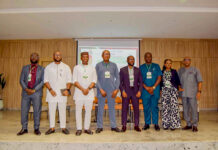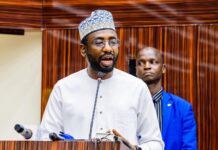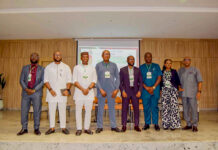NGO Explores Technology For Civic Space
TECH DIGEST – The Nigeria Network of NGOs (NNNGO) has taken non-profit leaders and civil society actors across the country on a resourceful exploration of digital rights, technologies, trends and techniques to engender a digitally robust future for the sector.
A statement by the NNNGO said a workshop was organised recently at Ibadan, the Oyo State capital with support from the International Centre for Not-for-Profit Law (ICNL) to discuss, share experience on the theme: ‘Understanding How Cyber/Digital Laws and Policies, AI, ML Big Data and Other Digital Technologies Impact Nonprofit Operations in Nigeria.’
The event was said to be imperative as the emergence of the COVID-19 pandemic in recent times has necessitated the need for government, business, and Civil Society Organisations (CSOs) to be proactive, “responsive and inclusive in using the internet and digital technologies to do their work as we have never seen in time past.”
The statement noted that the hybrid workshop which was attended by over 70 civil society organisations from across the country.
It also noted that the event featured presentations all delivered by seasoned Information and Communication Technology (ICT) experts and learned nonprofit experts drawn from across Nigeria and other African countries.
In his remarks, the keynote speaker, Executive Director, Freedom of Expression Hub, Uganda Catherine Anitte, highlighted the current trends and realities around the use of technologies across the world.
She disclosed the importance of localising and mainstreaming technology in Africa in ways that bring these issues around digital civil society to the fore within the third sector.
She said: “As Artificial Intelligence (AI), and ML gain traction in Nigeria and the rest of Africa, the enjoyment of digital rights, has been hindered by an arbitrary regime of policy, legislation and an overzealous regulatory framework. Censorship, surveillance, blockage of content, unnecessary persecution and prosecution are threatening the enjoyment of rights online and adversely affecting civil society organisations advocating for these rights.”
She expressed the need for CSOs to have a clear understanding of the policy, legislative and regulatory framework of digital rights, including the opportunities and challenges that AI and machine learning may pose to the broader enjoyment of human rights.
On his parts, the Executive Director, NNNGO, Oluseyi Oyebisi, said: “AI, ML and big data will cause the most significant shift in the way nonprofits do their work as we have never seen in times past.
“If civil society organisations are to play a critical role in decades to come, they must adopt a more radical approach to how they understand and interpret the pros and cons of AI, ML and big data to civic space and the attainment of the Sustainable Development Goals (SDGs).
“This event has come at a time when we are seeing the need for technology now, more than ever, especially with the need to stay distant but connected during this global pandemic and it is vital that civil society adapts to technological advancements so as to remain relevant in resolving the many challenges we face.”
The Nigeria Network of NGOs (NNNGO) has taken non-profit leaders and civil society actors across the country on a resourceful exploration of digital rights, technologies, trends and techniques to engender a digitally robust future for the sector.
A statement by the NNNGO said a workshop was organised recently at Ibadan, the Oyo State capital with support from the International Centre for Not-for-Profit Law (ICNL) to discuss, share experience on the theme: ‘Understanding How Cyber/Digital Laws and Policies, AI, ML Big Data and Other Digital Technologies Impact Nonprofit Operations in Nigeria.’
The event was said to be imperative as the emergence of the COVID-19 pandemic in recent times has necessitated the need for government, business, and Civil Society Organisations (CSOs) to be proactive, “responsive and inclusive in using the internet and digital technologies to do their work as we have never seen in time past.”
The statement noted that the hybrid workshop which was attended by over 70 civil society organisations from across the country.
It also noted that the event featured presentations all delivered by seasoned Information and Communication Technology (ICT) experts and learned nonprofit experts drawn from across Nigeria and other African countries.
In his remarks, the keynote speaker, Executive Director, Freedom of Expression Hub, Uganda Catherine Anitte, highlighted the current trends and realities around the use of technologies across the world.
She disclosed the importance of localising and mainstreaming technology in Africa in ways that bring these issues around digital civil society to the fore within the third sector.
She said: “As Artificial Intelligence (AI), and ML gain traction in Nigeria and the rest of Africa, the enjoyment of digital rights, has been hindered by an arbitrary regime of policy, legislation and an overzealous regulatory framework. Censorship, surveillance, blockage of content, unnecessary persecution and prosecution are threatening the enjoyment of rights online and adversely affecting civil society organisations advocating for these rights.”
She expressed the need for CSOs to have a clear understanding of the policy, legislative and regulatory framework of digital rights, including the opportunities and challenges that AI and machine learning may pose to the broader enjoyment of human rights.
On his parts, the Executive Director, NNNGO, Oluseyi Oyebisi, said: “AI, ML and big data will cause the most significant shift in the way nonprofits do their work as we have never seen in times past.
“If civil society organisations are to play a critical role in decades to come, they must adopt a more radical approach to how they understand and interpret the pros and cons of AI, ML and big data to civic space and the attainment of the Sustainable Development Goals (SDGs).
“This event has come at a time when we are seeing the need for technology now, more than ever, especially with the need to stay distant but connected during this global pandemic and it is vital that civil society adapts to technological advancements so as to remain relevant in resolving the many challenges we face.”
















